Tag: Sports History
The Life and Times of John Thompson
by The Cowl Editor on October 29, 2020
Friar Sports
Looking Back on One of College Basketball’s Legends
by Leo Hainline ’22
Sports Staff
Legendary coach and former Friar John Thompson ’64 passed away in late August at the age of 78, leaving behind an unparalleled legacy.
Thompson was a pioneer in the game of basketball. He was the first African American to lead his team to an NCAA Tournament Championship, which he did in 1984 with Georgetown University. During his time coaching the Hoyas, Thompson completely altered the college basketball landscape. He helped the Big East become the most renowned basketball conference in the country. His passing is felt not just by Providence College and Georgetown University, but by the entire college basketball world. The passion Thompson brought in both helping his team succeed on the court and in helping his players succeed off the court is one of the greatest examples of embodying the Friar Family mantra.
Thompson grew up in Washington, D.C., where he was a standout basketball player for Archbishop Carroll High School. He would lead the team to three consecutive city championships. During his college career, Thompson was a star for the Friars, scoring 1,520 points and grabbing 1,061 rebounds in his four years. The big man led PC to the National Invitational Tournament title in 1963, and, as a senior, he was a First-Team All-American. He also helped bring the program to its first ever NCAA Tournament appearance. Thompson was drafted by the Boston Celtics, allowing him to play alongside the legendary Bill Russell. He won two NBA titles in his two-year NBA career.
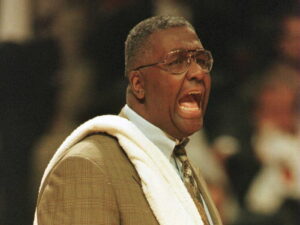
Following his playing career, Thompson returned to D.C. to become the head coach of the men’s basketball team and a guidance counselor at St. Anthony’s High School. Georgetown noticed his local success and hired Thompson as their head coach in 1972. He inherited a team that went 3-23 before his arrival. In just a few short years, he would drastically improve the program, making the Hoyas regulars in the NCAA Tournament.
Thompson changed the culture at Georgetown, as he built the program around relentless defending. He made sure his players gave it their all—both on the court and in the classroom. Thompson once famously said, “I don’t coach their team. They play on my team.” This philosophy turned Georgetown into one of the most dominant programs in the country.
Georgetown reached new heights in the early ’80s when Thompson was able to land the most sought-after recruit in the sport, Patrick Ewing. With the 7-footer protecting the paint, the Hoyas became a perennial powerhouse while elevating the standing of the Big East. In Ewing’s first year as a Hoya, the program fell just short of winning the NCAA title. They lost by one point to a Michael Jordan-led University of North Carolina team in what many consider to be an all-time classic.
Two years later, Georgetown was crowned the NCAA champion after defeating the University of Houston in the finals. After the game, when asked about being the first Black coach to win the NCAA title, Thompson responded, “I’m not interested in being the first or only Black doing anything because it implies that in 1984, a Black man finally became intelligent enough to win the NCAA title, and that’s a very misleading thing.” Thompson believed that any Black person could have achieved what he did if they were just given the chance. He also asserted that the most important part of Georgetown’s win was bringing a championship to the Mid-Atlantic region, which had not had a team win the NCAA Tournament in 30 years.
Under Thompson, Georgetown became known as one of the most aggressive, physical, and toughest teams in the country. They took pressure defense to a whole new level and set the tone for the rest of the Big East, which soon became known as the most physical conference in college basketball. Some loved them, some hated them, but Thompson’s team was unquestionably built differently than any other team in college hoops. They were everyone’s rival: everyone wanted to beat Georgetown.
Thompson was at the head of a trend that saw Big East coaches become not just coaches, but also important figures in popular culture. Thompson was passionate and vocal while coaching, and standing at 6 feet 10 inches, his presence was always felt, regardless of whether spectators were in the arena or watching the game at home. He was one of the original, great coaches of the conference, along with the likes of Jim Boeheim at Syracuse University, Rollie Massimino at Villanova University, Lou Carnesecca at St. John’s University, and P.J. Carlesimo at Seton Hall University. These men all set the precedent of the Big East having some of the country’s best coaches and the most captivating personalities.
Each coach had his own distinct flair and style. Thompson was especially known for defending his players when they needed him. In an 1983 incident, Thompson removed his players from the court during a game against Villanova until racist banners targeting Patrick Ewing were taken down. Thompson also limited player interviews to protect them from the media, which often skewed stories or sometimes portrayed the almost all-Black Georgetown roster in an unfavorable light.
Along with his success on the court, Thompson’s care for his players and those around him off the court was also unique. He understood that life was about more than winning basketball games. He treated the people around him with kindness and respect. Indeed, John Thompson’s Georgetown teams transformed college basketball. His program boosted the reputation of the Big East, which had the effect of turning college basketball into must-see TV for average Americans in a way that it never was before.
Not everyone can replicate Thompson’s coaching brilliance on the sidelines, but everyone can look to him to see how we can make a positive impact on other people’s lives. The world truly lost one of the all-time greats with his passing.
100 Years of PC Basketball
by The Cowl Editor on October 4, 2020
Friar Sports
A Look Back at Some of the Team’s Most Memorable Moment’s
by Joseph Quirk ’23
Sports Staff
Providence College is known for many things: great academics, a friendly overall student atmosphere, and of course, its famed white-robed Dominican Friars who run the institution. Indeed, what makes Friartown so special is the pride that students have for the College, and one of the biggest sources of that school pride is PC basketball. A tradition in its own right, the men’s basketball team is a central part of life at the College, and has certainly provided PC with a fair share of memorable moments. Oct. 1, 2020 marks 100 years of PC men’s hoops, so let us take a look back at PC basketball’s storied history.
The Al McClellan Era:
Despite basketball being played for the first time at PC in 1920, the Friars’ first official varsity basketball season began in 1926. This upstart team was headed by Archie Golembeski, who at the time was also the College’s football coach. Golembeski left the following year to devote more time to football, so in came Al “The General” McClellan.
McClellan gave the program a much-needed boost in its early years: he helped lead the Friars to four New England Championships in 1929, 1930, 1932, and 1935. The Friars also finished in second place four times under McClellan. Vitally, he made the Friars one of the only New England colleges at the time willing to leave the New England area to play eastern basketball powers such as Seton Hall University, St. John’s University, Villanova University, and City College of New York.
McClellan also made the program one of only two New England schools to compete in the 1936 U.S. Olympic playoffs. Without McClellan’s willingness to push the boundaries, the PC basketball program may have died out much like Golembeski’s football program.
The Joe Mullaney Era:
A lot happened in the period between the initial success of McClellan and the hiring of Joe Mullaney. After McClellan left the team, the Friars were put into a “small school” conference, taking away their ability to play teams like St. John’s and Villanova. World War II shut the program down temporarily as well. Things started to change, however, when the sixth president of PC, Reverend Robert Joseph Slavin, O.P., recognized that the team could compete at the highest level of college basketball. A movement began to raise money to build a new gym on campus.
Then in 1955, the Friars took a gamble and hired Mullaney. Prior to joining PC, he had just one year of head coaching experience at Norwich University. Before that, Mullaney worked for the FBI. The young and unproven head coach would quickly prove the doubters wrong, as the Friars took off running under his coaching. They quickly notched a huge win over Notre Dame University, and the team climbed higher and higher from there.

In 1959, Mullaney coached the team to a quadruple-overtime win over perennial powerhouse Villanova, leading to their first National Invitational Tournament (NIT) bid. The Friars soon followed that up with an NIT championship game appearance in 1960 and then finally an NIT championship in 1961. In the 1960s the Friars were consistently a top-20 team and even had a streak of nine consecutive 20-win seasons.
In 1963, the Friars won the NIT again before reaching the Elite Eight of the NCAA tournament for the first time ever in 1965. They came into the tournament as the No. 4 team in the country. Jimmy Walker, one of Mullaney’s recruits and the leader of these mid-60s Friars, became PC’s first 2000-point scorer ever. Walker led the nation in scoring in 1967 and was soon drafted with the first pick in the NBA draft by the Detroit Pistons.
Mullaney spent 14 years with the Friars, leading them to a 271-94 record (.742) and two NIT championships. The only schools to post higher win percentages than Mullaney’s Friars in the 1960s were the University of California, Los Angeles and the University of Kentucky. Mullaney would leave the Friars in 1969, riding his Friartown success to the head coaching job for the Los Angeles Lakers.
The Dave Gavitt Era:
Dave Gavitt was an assistant on Joe Mullaney’s staff in the early ’60s before moving on to coach at Dartmouth College. After Mullaney’s departure to Los Angeles, Gavitt was hired back as his replacement, which ensured PC’s continued success. Gavitt, much like his predecessor, led the Friars to eight consecutive 20-win seasons and posted a 209-84 (.713) record. His teams featured six All-Americans, as well as a Sweet Sixteen appearance and a Final Four appearance during his 10-year tenure as coach of the Friars.
However, perhaps his biggest contribution to the program was directing national attention toward PC basketball. Gavitt recognized that the 3000-seat arena in Alumni Hall was too small for the Friars if they wanted to become a perennial competitor on the national stage. So, he negotiated a deal to play in the Providence Civic Center (renamed the Dunkin’ Donuts Center in 2001), which allowed the team to play big-time opponents in front of sellout crowds.
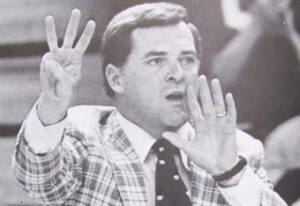
In 1976, Gavitt and PC set up their own holiday tournament, the InBank Classic, where they upset the University of Michigan in double overtime. In 1979, Gavitt stepped down as the coach of PC to become the first commissioner of the newly founded Big East Conference, in addition to his responsibilities as the College’s athletic director.
The 1987 Final Four:
PC was in a lull. Coach Gavitt had left the team right when its competition became tougher, as the creation of the Big East meant more games against teams such as Villanova, St. John’s, and Seton Hall. It also meant PC’s schedule was now filled with other basketball powerhouses from other big conferences such as the Atlantic Coast Conference and the Big 10.
With this major increase in competition, it became clear that the Friars lacked the talent to contend with the best teams. That is, until they hired Rick Pitino, an assistant coach from the New York Knicks. Pitino would field a winning team in his first season as coach before completely revamping the team in 1987. Led by point guard Billy Donovan, a future head coach himself, Pitino’s Friars roared to a 25-9 record and their first top-20 appearance in years.
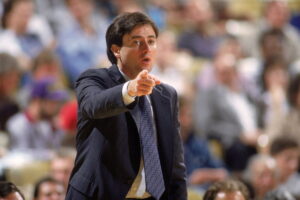
The team would dance all the way to their second Final Four ever. Although they lost to Syracuse University, the Friars were back on the map. Unfortunately, 1987 would be Pitino’s second and final season at PC, as he accepted an offer to return to New York to become the Knicks’ head coach.
The Ed Cooley Era:
After the Final Four run with Pitino in 1987, the Friars continued to have success, but to a lesser extent. The late 2000s featured a major lull in PC basketball history. However, the 2011 hiring of Providence, Rhode Island native Ed Cooley changed that.

Cooley has led Providence to some very successful seasons in recent years. This includes the College’s second-ever Big East title in 2014 and a string of five consecutive NCAA tournament appearances. He also led the team to big upset victories such as a win over third-ranked Villanova in 2018 and a historic run of consecutive wins against top-25 opponents in the 2019-2020 season. Additionally, Cooley produced top NBA talent such as Kris Dunn, and he continues to make the Friars a force in the Big East.
Cooley is now looking to build on the Friars’ 100 years of success as the team enters its second century of play.
Friars History: 2013 XCC Underdogs
by The Cowl Editor on February 7, 2019
Friar Sports
Coach Treacy Discusses Special 2013 Cross Country Season
by Eileen Flynn ’20
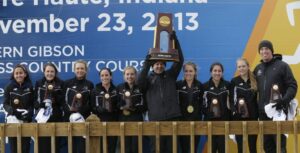
For the past 33 years, Providence College has been lucky enough to have one of the best cross country and track coaches in the nation. Ray Treacy ’82 came back to coach in 1984, just two years after he graduated. The running program at PC has grown into a powerful dynasty, finishing on the podium in seven different seasons over the course of the last 30 years. I recently got a chance to ask Coach Treacy a few questions about his time at the College. When asked if the big wins and success stories of his former players help him return each year with the same energy, Treacy smiled thinking about the past. “It definitely keeps you motivated. There is a turnover every year, you lose some great runners and bring in others. The cycle has been pretty good to us over the years. Each group that comes into the program motivates you in a different way.”
Although Coach Treacy enjoys every year, there are obviously some seasons that are more memorable than the rest. Luckily for the Friars, there have been two in the past 25 years that have been extra special. In 1995 and again in 2013, Providence College clinched the highest title in the nation and became NCAA champions. Treacy described the season leading up to the 2013 race and the hard work it took to come out on top. “We had the top-three runners in the country on our team: Sarah Law, Emily Sisson, and freshman Catarina Rocha. Our number five person, who is just as important as the number one person, was Grace Thek. Unfortunately, she didn’t race that season until the week before the Big East.” At the pre-nationals meet, PC and all the other contenders were out-raced by Georgetown. Without Thek, Coach Treacy appreciated the lack of attention his team received during the season. He wasn’t nervous about losing a couple spots in the national ranking. In fact, he was grateful that it lightened the pressure on his athletes.
“After we introduced her at the Big East meet, and it went really well, we knew we had a really good chance of winning it.”
Big East was first on the agenda and the athletes from the College were focused and prepared. “We dominated that day. We had three in the top four and Catarina finished in 7th while Grace was closely behind in 13th.”
The confidence that came with winning the Big East helped the Friars in the national competition. Luckily enough, there were no injuries in between races. The three high-profile, all-American runners for Providence were ready to lead their team for one final race. Coach Treacy was grateful for the shortcomings in his 2011 and 2012 seasons because he thinks his team learned a lot from losing. On a very windy day in November, the Friars beat teams like University of Arkansas, Georgetown University, and University of Arizona and took the national title for the first time in over 15 years. “A fall could put an end to your chances of winning so it was all about staying on your feet and executing the race to the best of our ability and we knew we’d win if we could do that.”
It takes a certain type of coach to lead a team to victory. When asked about his coaching style, Treacy gave some insight into how he manages his team. “It’s a very individual sport and we treat everyone individually. You’re a team until you step on the line, you’re an individual from the time the gun goes off to the time you finish and you’re a team again at the finish line. It’s a matter of everyone doing their job on that day, and if everyone does their job than you’re going to be successful.” And successful these Friars were, in 2013 and in seasons since.
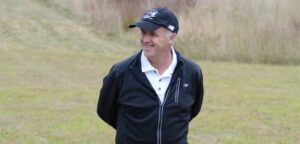
This past season was not exactly what Coach Treacy was hoping for, but even the Friars are allowed rebuilding years. “When you don’t go to the NCAA for us, that’s not good. A lot of things didn’t come together for us at the end of the season. To be successful at that level, you have to be good, but you also have to have a little bit of luck as well.” Looking forward, there is hopefully some luck in the future for the Friars. Although they will have a young team by normal standards, Coach Treacy is excited about the new talent joining the experienced group of runners. And with that Coach Treacy tells me, “I am just as excited about what I do now as I was 30 years ago.” The PC family is forever grateful to have a coach and person like Treacy on campus, and will be expecting great things as he continues his coaching career.
